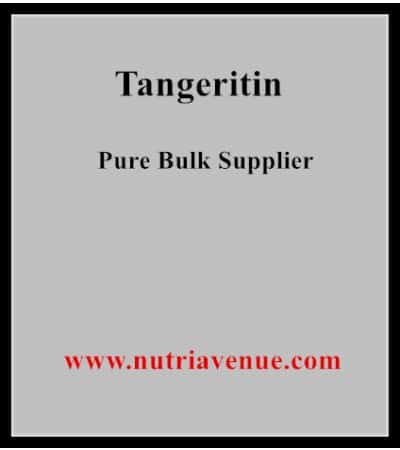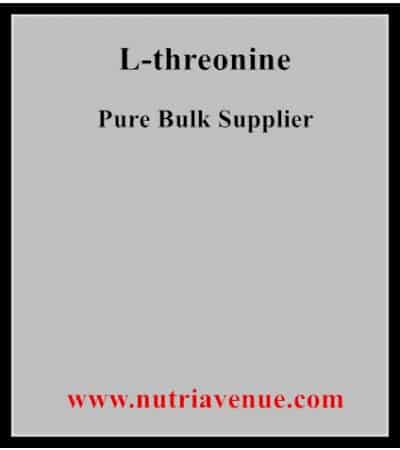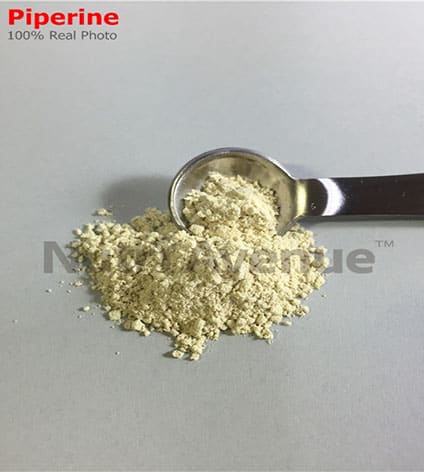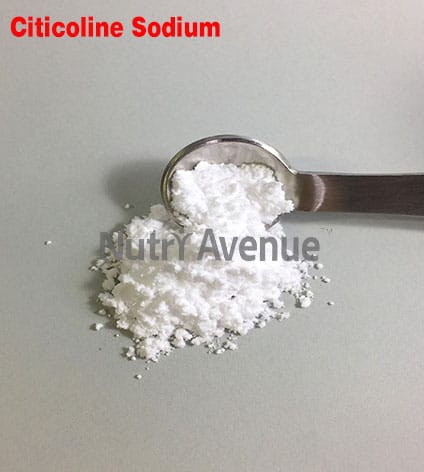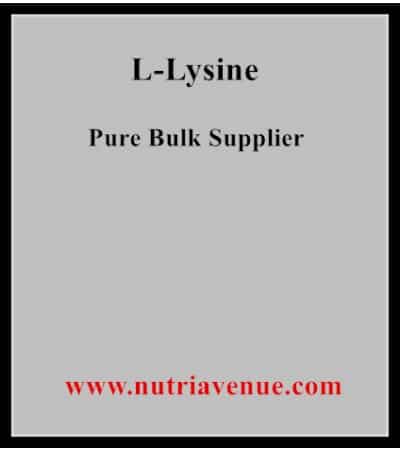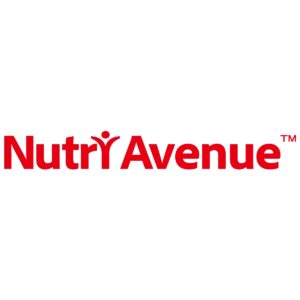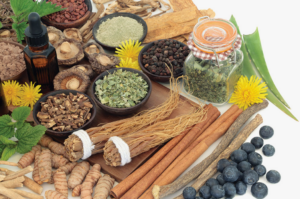What Is Tangeritin?
Tangeretin is a flavone compound belonging to the flavonoid class, which is found in the peels of citrus fruits such as tangerines. Tangeretin is a flavonoid belonging to the polymethoxy class, commonly present in citrus fruits. This compound has a range of health benefits, demonstrating anti-inflammatory, anti-allergic, anti-diabetic, anti-osteoporotic, and anticancer properties. Scientific studies have shown that tangeretin can effectively hinder the expression of IL-4 and TNF-α and suppress the activation of NF-kB, AP-1, and p38 in a skin-based allergic reaction in vivo model. Tangeretin holds the potential to induce cell cycle arrest and inhibit the proliferation of colon cancer and breast cancer cells. Notably, tangeretin also suppresses osteoclast formation, thereby demonstrating its potential efficacy as a treatment for bone diseases.
Bulk Tangeritin Powder Specification Sheet
Type | Flavonoid |
Appearance | White crystalline solid |
Purity | 99 % CP |
Certifications | Kosher, Halal, GMP, etc. |
Active Ingredient | alkaloids, flavonoids, saponins, and phenolics present in the extract of citrus peels |
Test Methods | HPLC |
MOQ (minimum order quantity) | 1kg |
Sample | Available (10-20g/bag) |
OEM Service | Available, such as capsules, tablets, pills, etc. |
ODM Service | Available |
Private Label | Available |
Contract Manufacturing | Available |
General Tangeritin Powder Production Process
Marmalade is a flavonoid compound found in citrus fruits, especially tangerines and oranges. It has antioxidant, anti-inflammatory and potentially anti-cancer properties. Extracting cellulite for various applications usually requires several steps. Below is a general overview of the tangeritin powder manufacturing process:
Step 1: Find and Prepare Raw Materials
Choose fresh citrus fruits, preferably tangerines or oranges.
Wash and inspect the fruit to ensure quality.
Step 2: Extracting cellulose
Extract cellulose from the peel or rind using solvent extraction, supercritical fluid extraction (SFE) or steam distillation.
Step 3: Purification
Impurities in the crude extract are removed using purification techniques such as chromatography.
Step 4: Drying
Dry the purified extract using methods such as spray drying or vacuum drying to remove solvents and water.
Step 5: Quality Control
Tests are conducted throughout the process to ensure purity, potency and safety.
Step 6: Packaging and Storage
Pack cellulose powder in airtight containers with appropriate labels and store in a cool, dry place away from sunlight.
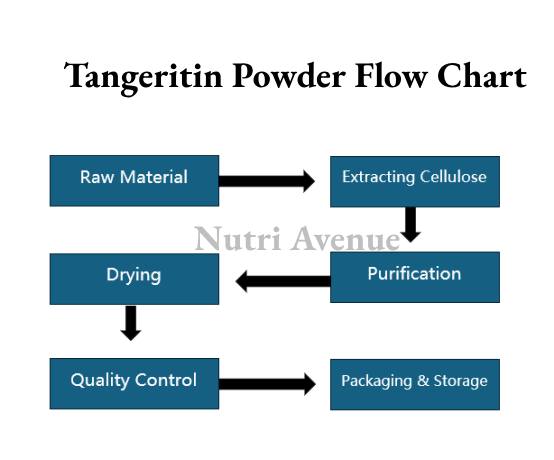
9 Health Benefits of Tangeritin
1.Rich in Nutrients
Tangeritin, despite their relatively smaller size in comparison to other citrus fruits like oranges and grapefruits, are known to be a rich source of nutrients and water. It is worth noting that tangerines are comprised of approximately 85% water content, which makes them an excellent choice to keep oneself hydrated.
Here’s the nutrient profile of 1 medium (88-gram) tangerine.
Calories: 47 | Fat: 0 grams |
Carbs: 12 grams | Vitamin C: 26% of the Daily Value (DV) |
Fiber: 2 grams | Vitamin A: 3% of the DV |
Protein: 0.7 grams | Potassium: 3% of the DV |
2.High in Antioxidants
Tangerines and their peels are a great source of antioxidants since they have a lot of vitamin C and flavonoids. These compounds help protect against different diseases. The peel of tangerines contains flavonoids, which is valuable for your diet. Eating tangerines and their peels can give you significant health benefits, so it’s a good idea to include them in your diet.
3.Immunity Boosters
Consuming tangerines is known to have a positive effect on the immune system, as they are a rich source of vitamin C. This vital nutrient is recognized for its ability to fortify the body’s defenses against viral and bacterial infections.
4.Improves Brain
Tangeritin ‘ antioxidants like vitamin C and nobiletin have potential to prevent brain cell damage associated with schizophrenia, Alzheimer’s and Parkinson’s. Nonetheless, human research is needed to confirm these findings.
5.Improves Skin Appearance
Tangerines are an excellent source of vitamin C, which promotes collagen synthesis. Collagen is crucial for wound healing and reducing signs of aging. Make sure you add tangerines to your diet to benefit from their nourishing properties.
6.Weight Loss
Eating tangerines can help you increase your fiber intake, which in turn can promote weight loss and prevent weight gain.
7.Good for the Heart
Tangerines are a valuable source of antioxidants that have the potential to mitigate risk factors associated with heart disease.
8.Anti- Cancer
Additional research is required to explore the possible anticancer effects associated with the antioxidants present in tangerines.
9.Diet- Friendly
Tangerines are a highly versatile fruit that can be incorporated into an array of dishes, ranging from breakfast options to delectable desserts and refreshing cocktails.
Side Effects and Safety of Tangeritin
- Tangeritinis safe to eat in the amounts typically found in foods. However, there isn’t enough reliable information to determine whether tangerines are safe to use as a medicine when taken orally.
- It’s unclear whether tangerine is safe to use on the skin or if it has any side effects. There is not enough reliable information available.
Applications of Tangeritin in Health
Tangeritin are naturally occurring compounds found exclusively in fruits and vegetables, and they exhibit a range of therapeutic and pharmacological effects. Tangeretin is a pivotal member of flavonoids and is widely distributed in citrus peels. It demonstrates several beneficial biological activities, including antioxidant, anti-inflammatory, antitumor, hepatoprotective, and neuroprotective effects. In this review, we examine the diverse therapeutic and pharmacological effects of TGN and elucidate the mechanisms by which this naturally occurring compound influences signaling pathways to exert its effects. With its vast pharmacological activities, it has been found to be present in a wide range of fruits and juices.
Is Tangereitin FDA-Approved?
So far, tangeretin itself is not FDA-approved as a standalone drug or supplement. It’s a flavonoid compound found in citrus fruits, studied for potential health benefits, including anti-inflammatory, anti-proliferative, and neuroprotective effects.
Studies have shown that tangeretin has the potential to serve as a promising therapeutic agent for treating various clinical conditions.
While generally recognized as safe (GRAS) in food amounts, specific products containing tangeretin would need FDA approval for health claims. Consult a healthcare professional before starting any new supplement regimen.
Purchase Bulk Tangeritin from Nutri Avenue – Your Trusted Supply Chain Partner
Tangeritin offers various benefits including mutation risk reduction, antibacterial properties, inflammation reduction, and antioxidant effects. Nutri Avenue is a leading raw supplement ingredients supplier and specialize in exporting food additives for different functions, muscle growth, skincare, etc. With experienced professionals, high product quality, competitive pricing, efficient service, and up-to-date market insights, we ensure your sourcing needs are met effectively.
FAQs
Tangerines and clementines, both citrus fruits, exhibit subtle yet distinct differences. Tangerines are more considerable, flatter in shape, and have a bumpy “pebble” texture.
Tangeritin, a natural substance, is found in various foods, including:
- Tangerines
- Oranges
- Mandarins
- Grapefruits
- Lemons and limes
- Other citrus fruits like pomelos, kumquats, and citrons
- Some herbs and spices, such as thyme and rosemary
Polymethoxyflavonoids, which contain two or more methoxyl groups in their basic structure, are abundant in citrus fruit peels, particularly in sweet oranges (Citrus sinensis), Satsuma mandarins (Citrus unshiu), and mandarin oranges (Citrus reticulata). Known for their anticancer properties, they are also considered plant metabolites.”

